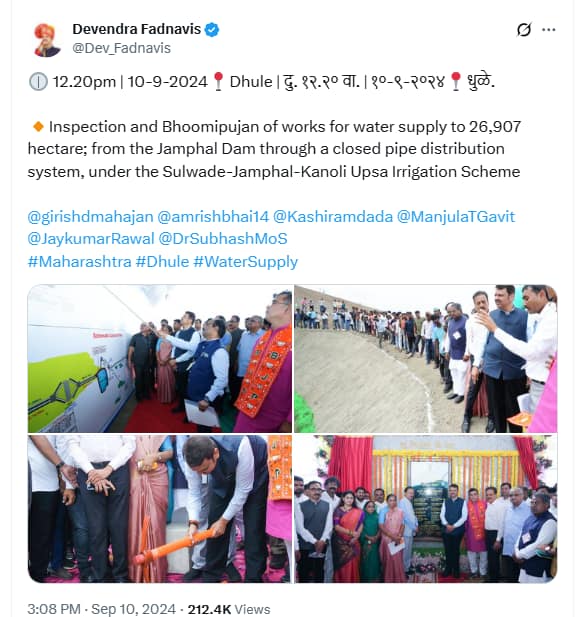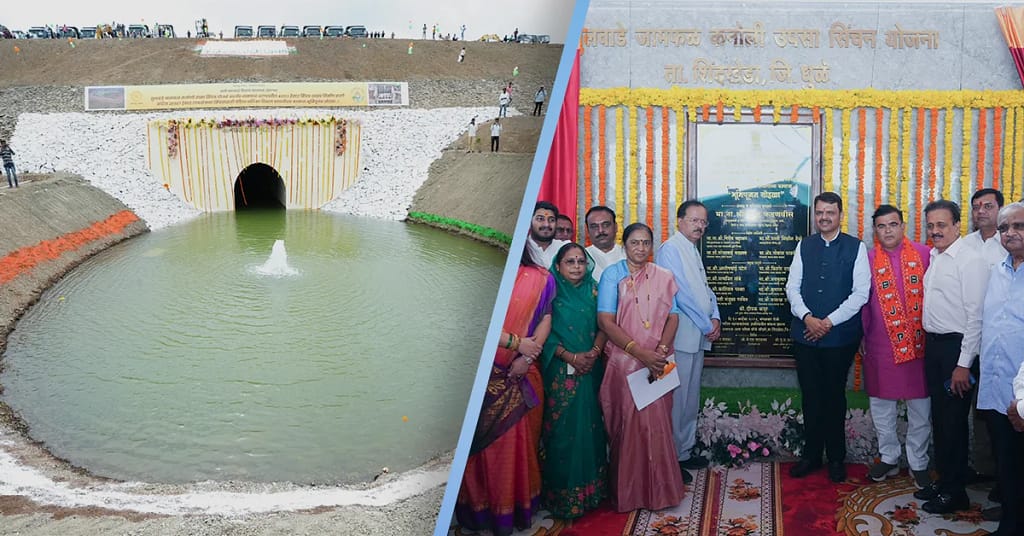The Dhule district in the Khandesh region of Maharashtra, often considered a gateway to the state due to its borders with Gujarat and Madhya Pradesh, is known for its many centuries-old history and culture. Although agriculture dominates its economy, the district thrived on agro-based industries and educational institutes in the recent past. Furthermore, the district has three important national highways passing through it. So, with an existing infrastructure setting and unique geographical advantage, the district promises significant development potential. Maharashtra Sevak Devendra Fadnavis recognized that, with proper initiatives from the government, Dhule can once again attain its past glory and become an important growth center in the Khandesh region. During his first term as chief minister, he launched many projects for the development of Dhule district and also followed up closely for the implementation of them. These include the Dhule Logistics Hub, the Dhule Railway Project, the Solar Energy Project, Mukhyamantri Gram Sadak Yojana, and the Sulwade-Jamphal-Kanoli Upsa Irrigation Scheme in Dhule, as well as other irrigation projects. His efforts to identify Dhule’s development potentials and reinvigorate the district, which was downsliding due to lack of development, have started bearing fruits.
Focus on infrastructure in the district
Devendra Fadnavis, during his previous tenure as Chief Minister, put impetus on the infrastructure building in Dhule by approving road and railway projects for the district. During this period, he performed the ground breaking ceremony of the Sindkhedraja-Warpada Gram Sadak road in 2019, under the Mukhyamantri Gram Sadak Yojana. Also, as an outcome of his constant efforts, the decades-pending Dhule-Manmad-Indore railway line became a reality – the long expectation of the people of Dhule finally came through. In 2019, Prime Minister Narendra Modi performed the ground breaking ceremony and dedication of many projects benefitting Dhule, such as the Sulvade-Jamphal-Konoli Upsa Irrigation Scheme (project cost Rs 2408 crore), the Dhule-Nardana railway line (project cost Rs 8858 crore), and the Jalgaon-Manmad third railway line (project cost Rs 1035 crore). These, along with a surge in Dhule infrastructure projects like the Mumbai-Delhi Industrial Corridor, Nardana MIDC, Dhule Logistics Hub, Solar Energy Project, etc. will turn the district into the next industrial and logistics center of Maharashtra. Also, the fact that the district has 6 national highways passing through it can significantly boost Dhule’s opportunities.

Smooth allocation of funds for irrigation projects
The Sulvade-Jamphal-Kanoli Upsa Irrigation scheme in the Tapi basin is a major project to help agriculture in Dhule district. The project was unveiled by PM Modi during the first Devendra Fadnavis government. Now the Mahayuti government 2.0 under Devendra Fadnavis gave the second administrative approval worth Rs 5,329 crore for this scheme. This project is being developed at Dabhashi village near Sulwade in Shindkheda taluk under Tapi Patbandhare Development Corporation. The project will irrigate 26909 26,907 hectares of land in 48 villages of Sindkheda taluka and 6,460 hectares of land in 23 villages of Dhul taluka, i.e. a total of 33,367 hectares of land in Dhule district will be irrigated. On September 1, 1999, the first administrative approval of Rs 788.89 crore was issued for the project. After that, the Devendra Fadnavis government revised the first administrative approval to accommodate the increased cost of Rs 2407.67 crore on November 2, 2017. After that the Fadnavis government revised the administrative approval for the second time. This project has been included in the Baliraja Jalsanjeevani Yojana of the Central Government. Till March 2025, Rs 2407.67 crore has been spent on this project. Meanwhile, the Mahayuti government finished the Akkalpada Dam project for a permanent supply of drinking water to Dhule city.
Dondai Solar Park and Ner Solar Project
Under the policy of the Fadnavis government, Dhule also experienced a thrust in the sustainable energy production and use. Approval was given to set up a solar power project with a total capacity of 7 MW at Noornagar and Khandlai Budruk of Nere Gram Panchayat in Dhule taluka. This project will make it possible to supply electricity to the surrounding villages for eight hours continuously . Also, the process of acquiring land for a 250 MW solar park in Dondaicha is underway. 1000 acres of land is required for this solar project. For this, Devendra Fadnavis is giving personal attention and accelerating this work.
Logistics hub for industry expansion
Logistics hubs are crucial for industrialization as they streamline the flow of goods, reduce production time and costs, and improve efficiency, ultimately supporting economic growth and job creation. To encourage the revival of industrialization in and around Dhule, CM Fadnavis held a meeting with experts at Nuktech Vidhan Bhavan to discuss the feasibility of setting up a logistics hub at Dhule, examine its technical, economic and logistics aspects, and speed up the approval process for the same.
In the meeting he also reviewed various other matters relating to Dhule, such as the coordination level with the Disaster Management Department to handle the flood situation in Devpur, Valwadi and Sakhal Bhagane, faster fund approval for Ductile Iron Pipeline, Solar Storage Project and Bhuyari Sewage Scheme, keeping in mind the expansion of the city, etc. He also gave instructions to set up solar projects to save the municipal corporation’s electricity expenses every year.
Earlier in 2019, under the Amrit Yojana initiated by the then Fadnavis government, with a view to developing the city, Dhule Municipal Corporation was approved for a water supply project of Rs 154 crore and a sewage project of Rs 136 crore. At that time, the state government had also provided a fund of Rs 100 crore for roads in Dhule city and Rs 500 crore for underground drainage in four months. Apart from those, under the Urban Upliftment Scheme, the city expanded from 46.46 sq. km to 101.08 sq. km, and more funds were provided to ensure basic facilities in the extended portion. A shopping center was built on the MHADA site along Chalisgaon Road and a working women’s hostel also came up. The education, justice system and labor welfare sectors of Dhule district were given new life – approval was given to establish a new social work college in Sakri taluka through Sant Tukaram Social Organization, a fund of Rs 16 crore was approved for building a Kamgar Bhavan in the district headquarters and a hall at the court building in Dondaicha.
The leadership and vision of Chief Minister Devendra Fadnavis for development of Dhule were clearly visible at all stages, such as planning various schemes for the district, technical recognition, approval of funds, and implementation. He has tried to shape Dhule district not only as an administrative centre, but also as a bustling city with strong logistics and industrial bases.

